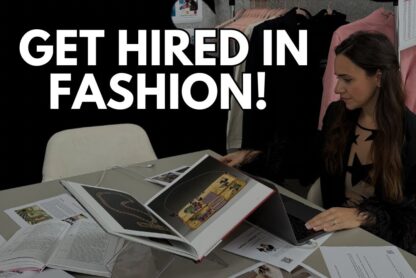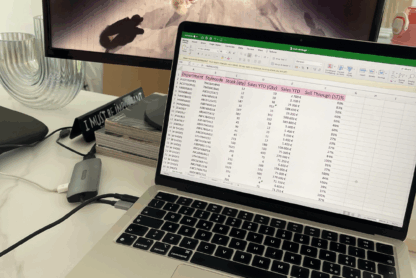Many of you often ask me what skills or experiences you can build up to have more chances to land your dream role in fashion. So I wanted to write this article because while many people focus on technical skills, something that not everyone considers is the fact that it’s also the attitudes that matter and can make you succeed in the fashion world.
Indeed, while techical skills are great to have in your skillset, they are not everything. Employers often look beyond those and search for candidates will the right attitudes.
Attitudes in Fashion
Put simply, companies prefer hiring people with the right attitudes and mindset more than someone with three fashion degrees and a master’s but with the wrong attitudes and mindset. Why? Because technical skills can be taught on the job, but your mindset and your attitudes likely won’t. Yet it’s the part that contributes to the success of your job and company. So if you want to land the job of your dreams and succeed in the industry, make sure the employer understands you are prepared to face any challenge and task, as they will really make the difference in your applications.
Your attitude and minset can actually play in your favor. Even if you don’t have a fashion master or you don’t have experience yet, you can still break into fashion (I teach this in my online course Break Into The Fashion Industry). Because like I said many many times, everyone in fashion started from scratch and without experience and a short resume, and so can you.
Adopting the right attitudes has contributed successfully to my chances of breaking into fashion so quickly. I’ll share the right attitudes you need to succeed in fashion below while also referring to some examples of things that worked for me.
Watch this video or keep reading the article.
What attitudes (aspiring) every fashion professional should adopt?
Be proactive
During the job interview for my first internship at Alexander McQueen, I told the recruiter that before going there, I went through the newsletter of AMQ, tested all the links, and found that one was broken. The manager and the recruiter who interviewed me were impressed by this information. Subscribing to the newsletter of the brand was indeed not something expressly requested before going to the job interview but they highly appreciated this initiative, plus it was also good that I was able to spot that broken link. One of my responsibilities as an intern was to manage the newsletter of AMQ so that’s when I had the idea of wanting to subscribe to the newsletter and testing all links. I kept this proactive attitude even once I got the job. I was never waiting for my boss to tell me what to do.
Genuinely care about the company
Genuinely caring about the company you work for and not passively going there just to complete your to-do list of the day is what makes the difference in the office between people who make great progress and those who find themselves having to look for another job at the end of their contract. When you care about the company as if it’s yours, you also think beyond your tasks. You also anticipate what could be next or the next initiatives without waiting for your boss to always tell you. At Alexander McQueen, I was doing what was in my duties but I also went beyond and thought about the next step.
Can do attitude
It will happen throughout your career that your boss will ask you to do something that you either have never done before or that goes beyond your regular to-do list. When these situations happen, people react in two ways: some say they have never done it before and start complaining and getting stressed and nervous, and others say “Okay, no problem, I have never done it before but I’ll figure it out.”
Embracing the “can-do” attitude means approaching tasks and obstacles with the belief that they can be overcome. It’s a commitment to seeking solutions, taking initiative, and persisting even in the face of adversity. It goes without saying that companies prefer that kind of people, and it’s one of the best attitudes you need to succeed in fashion. Whenever my boss assigned me something new that went beyond my comfort zone, I always said yes and saw it as an opportunity to demonstrate my adaptability as well as my ability to overcome new challenges. This allowed me to get assigned more responsibilities and thus become an essential part of the team even when I was just an intern.
Lesson of the day: Don’t be easily replaceable if you want to keep your job or get a promotion. Remember that automatic tasks can easily be passed onto someone else, so it’s everything you do beyond those and your way of approaching tough situations that will make you stand apart from other people and thus get promotions.
Problem-solving
This goes hand-in-hand with the can-do attitude, but besides having the motivation to do a difficult task for you, (which is halfway to success!) you should then know how to solve the problem. Of course, as an intern or assistant, you won’t be dealing with too hard situations when the company’s reputation or budget is at stake. However, even at entry-level positions, you will likely face some kind of problem in your daily routine that needs to be fixed.
For example, imagine there is an issue with the formula in Excel and you can’t see all the right data unless you fix it. (P.S You know how to use Excel for Fashion, right?) Or say an item has been lost during the editorial photoshoot, and you have to find it to return to the brand. You can encounter many issues at your job or internship in fashion, from minor to bigger ones. Sometimes, you will have to fix them yourself because your boss won’t have the time to deal with this themselves. In any case, being a problem solver means not panicking in the face of difficulty, building a plan of how to fix the issue, and solving it quickly. It’s okay to ask colleagues for help; what matters is showing you noticed the problem and showed interest in helping to solve it.
Read and listen
You might think this tip doesn’t make much sense, but trust me on this one. It happened many times that I posted something on Instagram or a new job on the website or via email and people asked me for things that I already explained in a part of the article, in the IG caption, or in the job description. If I post a job online and you ask me something about the position that is written inside the job description or that you can google easily (like my name for example) then I move your application to the trash in a matter of seconds. It might sound brutal but as companies, we are looking to hire smart people who can at least read a page. If you missed this information, what else can you miss when you get the job? So please pay attention to what you read before you write an email and reserve your questions to things that you cannot find online.
Continuous learning and adaptability
Successful fashion professionals embrace the mindset of continuous learning. In the ever-evolving realm of fashion, the pursuit of knowledge is a never-ending journey that extends beyond the confines of a formal fashion degree. Even for those who have completed a fashion degree or master’s, the importance of continuous learning remains paramount.
The dynamic nature of fashion demands a proactive approach to staying relevant and innovative. By enrolling in online courses, engaging in self-directed learning, and staying attuned to industry developments, you can demonstrate a commitment that goes beyond traditional qualifications. By the way, at the Glam Observer Fashion Academy, we offer several online courses to break into the fashion industry and gain relevant skills, such as Excel, writing, and fashion history.
To recall my job interview with Alexander McQueen, the significance of ongoing learning was underscored. The interviewer recognized the value of the online courses I had pursued during and post my fashion management master’s degree. These supplementary courses showcased not only my passion and dedication but also my growth mindset – the determination to continuously expand my horizons. As the fashion landscape reinvents itself, remaining a lifelong learner is the compass that navigates success. It ensures professionals remain equipped with latest trends, new skills and fresh perspectives in the ever-changing fashion realm.
Creative + Business mindset
In fashion, possessing a harmonious blend of creative and business acumen is an invaluable asset. A creative mindset ignites innovation and uniqueness, fostering the development of fresh ideas and designs that captivate and inspire. This artistic flair not only fuels the aesthetic aspects of the industry but also infuses products and campaigns with a distinctive allure. That’s why being creative is not only something required for designers, stylists, or photographers but also when developing successful marketing campaigns, events or social media posts, or when writing articles, as your creative muscle is involved as well.
Coupling this creativity with a strategic business mindset is equally imperative. Understanding market trends, consumer preferences, and the intricacies of production and distribution ensures that creative endeavors translate into tangible success. The synergy between creativity and business finesse allows for designs to not only resonate artistically but also resonate with the target audience, ultimately carving a sustainable and impactful niche in the competitive fashion landscape.
Let me give you another example based on my personal experience. During my job interview at Alexander McQueen, the recruiter told me he was impressed by the fact that I had started an Etsy store where I was selling some fashion illustrations when I was a student. It was a way to support myself financially a bit while also developing skills on the side. I added this to my resume and they all were impressed by this initiative as well as the fact that I had a creative mind (for the illustrations I created) and a sort of entrepreneurial mind as I was selling those online.
How to gain the right attitudes?
Gaining the right attitudes if you weren’t born with them can be actually harder and longer than learning the hard skills. As the attitudes we adopt at work is the product of our mindset, personality, and how we deal with things in the daily life. However, it’s not impossible, and you can do pretty much anything with dedication and force of habit. Especially when you are at the beginning of your career and aren’t influenced by your past experiences where you could’ve handled things differently. One thing is sure: the right attitudes won’t naturally become part of you if you don’t develop them intentionally.
The attitudes you need to succeed in fashion involves a combination of self-awareness, intentional practices, and continuous learning. Are you scared of unpredictable situations? Volunteer to help with a task or project that looks challenging. Take a short course about a program that would make your job easier. Or start simple by paying more attention to what’s happening and being told at your fashion office. Give yourself time to fully incorporate those attitudes into your work ethic, but try to use them as soon as you start a new job or internship, little by little.
I also believe that a lot of your mindset is given by the people you surround yourself with. Are you surrounded by smart and positive people? Who are your mentors and people you look up to? Try to get closer to your mentors by taking their courses, reading their books, or seeking personal advice. You are the average of the 5 people you spend most of your time with, so choose wisely and surround yourself (even virtually, online) with people who are smart and positive.
How can fashion companies spot if you have the right mindset?
The way you write your emails
The way you write your emails when applying for a job or internship says a lot about you. Who do you address your email to? Writing “dear sir/madame” or “to whom it may concern” shows that you didn’t do your research enough.
Another example of a bad email that will end your application before it even starts? I get emails from people who ask me to get a fashion design job/internship or to volunteer during fashion week but at Glam Observer we don’t design anything so when I receive these emails, I move them into the trash folder without either opening the attached resume as it shows this person didn’t do their research about the company at all but they are just trying to get one job emailing whoever. That’s definitely not a good sign of having the right mindset or attitude. And if I do it, trust me that the big brands move your applications to trash even quicker considering how many applications they get.
How you structure your resume is also important. It’s not about adding more but also being selective with what you add: the template you choose, the font, the size, the colors, etc. If you add something that is not relevant to the position just to make your resume look more full, then you can come across as someone who didn’t understand the position very well or that you are just trying to add something irrelevant to impress recruiters.
Your social media presence
With hundreds of comments under my posts on Instagram, I get to see many Instagram profiles from you asking me questions. And I have to say, while I do see great ones, I find that there are many that are very poorly curated. While it’s understandable that not all of you want to become designers or stylists and see yourself on the management side of the industry, you need to have a curated and nice profile. As social media presence is nowadays one of the key attitudes you need to succeed in fashion.
Social media presence also applies to how you curate your LinkedIn profile. This #1 professional platform can make you hired or send the recruiters away depending on how you curate your profile.
Read here what to post on social media if you want to work in fashion.
How you act and what you say during your job interview
The #1 place where companies can really test your attitudes and mindset is during a job interview. I know how stressful it can be, but you have to learn to work on that nervous feeling. Very often, the stress is caused by a lack of preparation (doing your research about the company, understanding the job description, etc.) and practice (preparing your answers to common interview questions, doing a job interview simulation with a friend, etc.). This is why you have to prepare for each interview and practice what you’ll say. If you don’t speak clearly, make too long pauses to answer a question, and don’t use body language well, the recruiter won’t see you as someone confident and with the right attitude.
To conclude, the right attitudes will put you on the shortlist and lead to success in your fashion career. If you feel like you have been neglecting them, start practicing on your weak areas, as they can make you stand out and irreplaceable for fashion companies.
Do you feel more ready to get a job in fashion now that you learned this another secret trick? Register here for my free online webinar where I will teach you 5 insider out-of-the-box strategies to catch the attention of fashion companies and break into the industry quickly.







